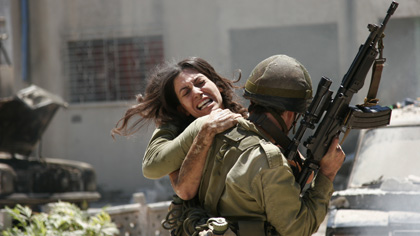Primary navigation

Israel/France/Germany 2009

Reviewed by Roger Clarke
Our synopses give away the plot in full, including surprise twists.
The First Lebanon War, June 1982. A lone Israeli tank is dispatched alongside a small army unit to search a hostile town already almost destroyed by the Israeli Air Force. Inside the tank are four young conscripts with no battle experience; the gunner, Shmulik, freezes when ordered to fire on an oncoming car being used by local militia. As a result, an Israeli soldier is killed; his body is temporarily placed in the tank. Arriving at the supposedly subjugated town, the tank is damaged in a rocket attack, which also kills local civilians. A captured Syrian is bundled into the tank soon after it becomes clear that the expedition is off-course and isolated in a dangerous situation. Local Phalangists arrive to ‘guide’ the tank but their motives quickly become suspect; speaking Arabic, which the soldiers don’t understand, a Phalangist describes to the Syrian captive the torture that awaits him. Frustrated that the crew won’t hand over the Syrian, the Phalangists lure the tank to a location where it comes under assault from unseen assailants. Yigal, the driver, is killed. Finally the crew emerge from the darkness to find themselves in a brightly lit sunflower field.
“Man is steel, the tank is only iron,” reads a sign inside the Israeli tank which is our home for the 93 minutes this film spends disproving that notion. Beginning in a sunflower field, the film ends with a shot of our tank standing in the same field after its journey into the war zone of 1982 Lebanon, as pitiless an intruder as the black crows in a Van Gogh wheatfield.
Lebanon, low-budget winner of the Golden Lion at the 2009 Venice Film Festival, was written and directed by Samuel Maoz, who based the script on his own experiences in the Israeli Armored Corps as a young man. While filming it, the production notes tell us, he grew feverish with an inexplicable foot infection, waking up from sleep one day to find that five small pieces of shrapnel had fallen from the broken skin, “the last testimony to the Lebanon War that my body suddenly decided to eject after 24 years.”
This intensely personal grasp of the subject-matter is projected through a dark lens of claustrophobia: we never really leave the tank throughout the entire film, and are hemmed in with the conscript crew of four, who spend their time either frozen with fear or quarrelling among themselves and especially with their commanding officer. While there may be comparisons to be made with a film such as Das Boot (1981), what sets this apart from more conventional productions is the monomaniacal tone and the incredibly well-designed soundscape by Alex Claude.
Sound is what brings the film into focus – the shuddering, greedy roiling of the tank’s engine; the curious champagne-cork popping of its viewfinder zooming in and out on targets and non-targets; the radio crackle, at once soothing and deadly, of the command centre, which seems to know all and reveal nothing. Music, if you can call it that, tends to be a single plucked note of a stringed instrument, repeated and occasionally modulated, melting, at the most nightmarish moments, into a synthesiser mood noise. The moment of maximum danger involves some old-fashioned Arabic waltz music – played as a sinister prelude to attack when the tank is lured inside a building – which is somehow and insidiously connected to the threat of torture issued by the Christian-Arab Phalangist the crew encounter along the way, like the theme tune of Brazil played underwater in a Lebanese souk.
This Phalangist, initially presented as the man who will help the Israeli unit out of the war zone they have strayed into, is one of just a few people – the unit commanding officer, a dead Israeli soldier and a Syrian prisoner being the others – who enter the Stygian world of the tank and interact with the crew. The audience becomes complicit with him when his Arabic speech is subtitled – he will extract one of the Syrian’s eyes with a spoon, he says, he will cut off his genitals, he will tear him to pieces by tying him to two cars. He smiles and nods at the tank crew, who have no idea what he is saying: “Take good care of him,” he grins, “he is a prisoner of war.”
Inside the tank it’s sometimes hard to tell the men apart – everything is dimly lit or seen in profile – but what is clear is that these four very ordinary 20-year-olds don’t want to be there, and are being brutalised and damaged by the experience. The director, who admits to having killed a man on his own tour of duty, is painting a portrait of an utterly hopeless, chaotic and morally compromised scenario in which nobody wins. The tank is a character in itself – it breathes fumes, rattles and leaks oil everywhere like the acid drool slavering from the jaws of Ridley Scott’s alien.
The tank may be made of iron, but man, in this film, is certainly not made of steel. Central command, that crackling, all-knowing voice that fills the small vehicle, describes Israeli soldiers in code. Alive they are “flowers” and dead they are “angels”. Central Command, you see, is the voice of God, and men are either blooms or brightly transcendent in their martyrdom, already eaten by the beast and enduring, like Jonah, a test from their pitiless deity.
The Palestine Film Festival reviewed by Adania Shibli (May 2010)
Not forgotten: Adania Shibli on Sarah Wood’s For Cultural Purposes Only and the lost Palestinian Film Archive (November 2009)
Bomb culture: B. Ruby Rich on Hany Abu-Assad’s Paradise Now (April 2006)
Paradise Now reviewed by Ali Jafaar (May 2006)
The Bible from God to DreamWorks: Simon Louvish on The Prince of Egypt’s Tinseltown-style Exodus (January 1999)